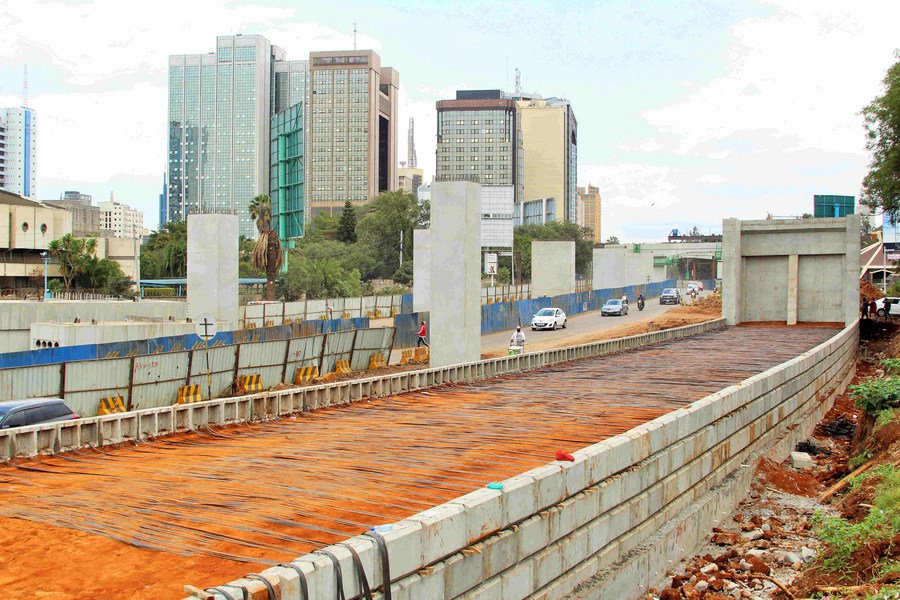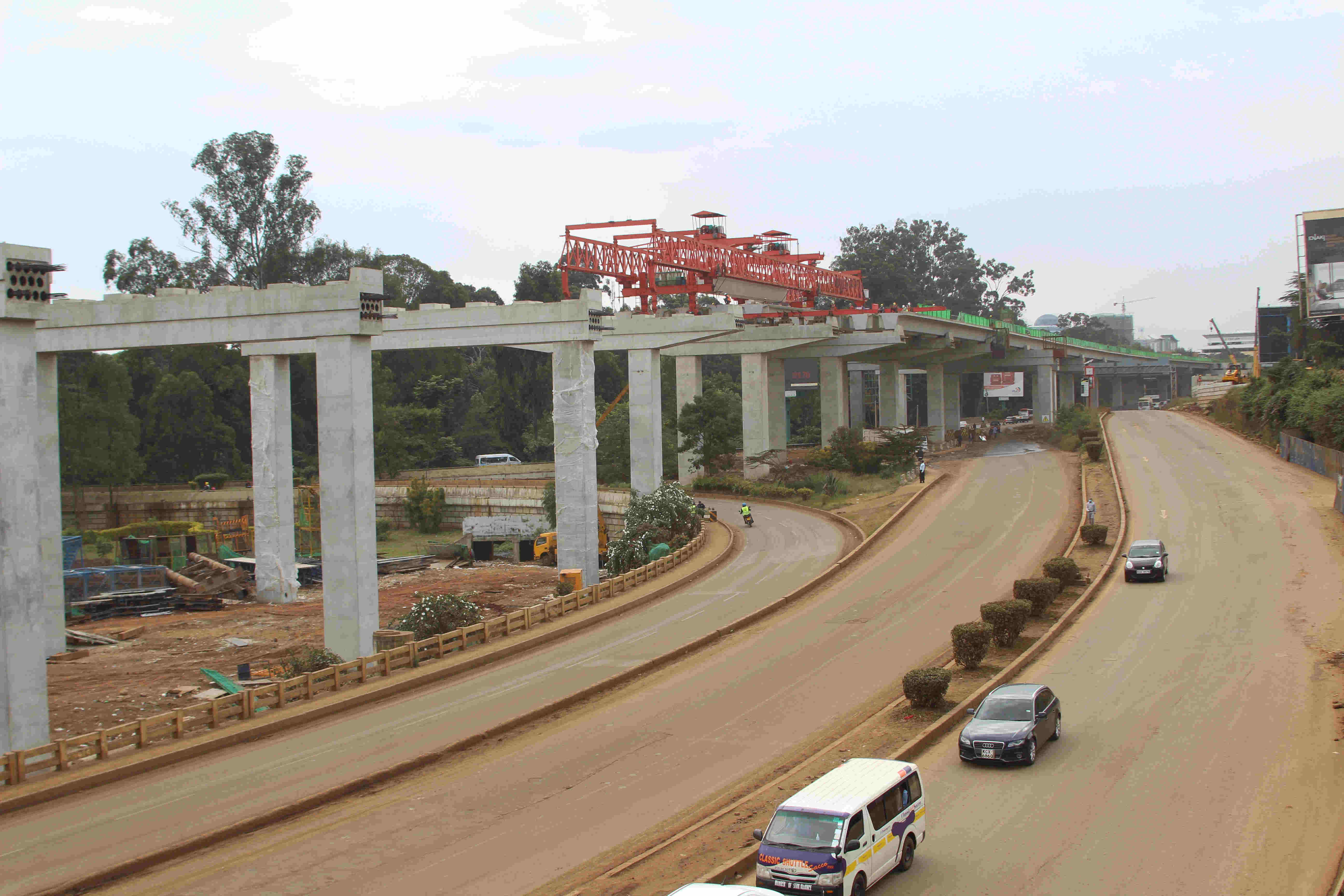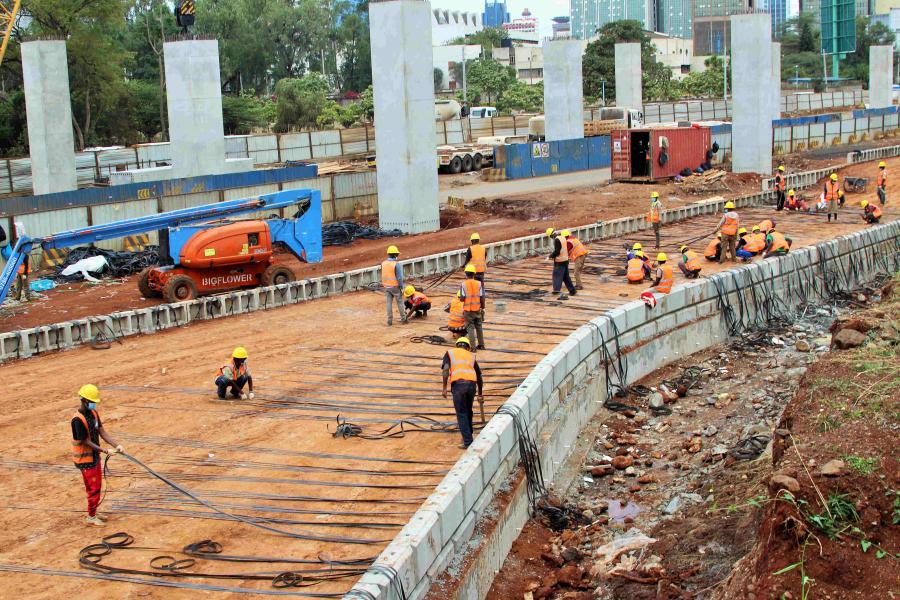
Motorists are seen along a section of the Nairobi Expressway under construction in Nairobi, capital of Kenya, on July 13, 2021. (Xinhua/Charles Onyango)
Maloni is among the thousands of daily commuters who are eagerly awaiting the completion of the Nairobi Expressway, which is currently under construction via a public-private partnership model by the China Road and Bridge Corporation.
NAIROBI, July 14 (Xinhua) -- Bernard Maloni lives in Mlolongo town located about 23 km southeast of the Kenyan capital Nairobi's central business district but works in Westlands on the western side of the capital city.
Maloni's daily commute of about 30 km takes the self-employed electric engineer between two and three hours one way by car depending on the level of traffic on the roads.
His main source of income is repairing faulty electric equipment that his customers bring to his workshop as early as 6.00 a.m.
"Most of my clients operate electric machines which sometimes break down at night and hence need urgent service before day break," Maloni told Xinhua on Tuesday.
The 35-year-old said that the amount of time he spends on the road takes a heavy toll on him because he cannot attend to his early morning clients on time.
"Due to the amount of traffic on the road, I typically arrive at work at 8 am and this means lost revenue," he said.
Maloni is among the thousands of daily commuters who are eagerly awaiting the completion of the Nairobi Expressway.
The road is currently under construction via a public-private partnership model by the China Road and Bridge Corporation (CRBC).

Motorists pass along a section of the Nairobi Expressway under construction in Nairobi, capital of Kenya, on July 13, 2021. (Xinhua/Charles Onyango)
The 27.1 km dual carriageway starts from Mlolongo on the Mombasa-Nairobi highway and stretches through the Nairobi city center and terminates at a road in the western part of the city.
The road project will have ten interchanges for entry and exit out of the facility.
James Macharia, cabinet secretary, Ministry of Transport, Infrastructure Housing, Urban Development and Public Works, said that the main reason for the construction of the road was to eliminate the traffic congestion between Mlolongo and the Nairobi city center.
Macharia said that the contractor is working on a 24-hour basis to ensure that it is completed by December. According to the Kenya National Highway Authority (KeNHA), the project is about 60 percent complete and will reduce travel time between Mlolongo and Westlands from the current two hours to 20 minutes.
The roads agency said that the project is part of the Northern transport corridor that is the main gateway for imports and exports between the port of Mombasa and the landlocked countries of Uganda, and Rwanda, among others.

Workers perform their tasks at a section of the Nairobi Expressway project in Museum Hill, Nairobi, capital of Kenya, on July 13, 2021. (Xinhua/Charles Onyango)
KeNHA said that the Nairobi expressway will also improve the country's status as a regional transportation hub due to a lower cost of transportation.
Kendrick Bosire, a taxi operator blames the perennial traffic jam along the Mombasa road on his daily revenues which average 20 dollars per day.
"I am only able to make three trips daily along the Mombasa road due to slow movement of vehicles," Bosire said.
He observed that with the opening of the Nairobi Expressway, he hopes to make at least six trips which will double his income.
Elaine Wawire, a trader said that due to traffic congestion on Mombasa road, she is forced to close her shop that is located in Nairobi's downturn early every day.
"I have to be at home by 6 p.m. to cook dinner for my family so that means I have to close the business by 4 00 p.m. in order to beat traffic," she added.
Wawire noted that once the Nairobi Expressway is operational, her business will be open for more hours during the day resulting in higher income.




